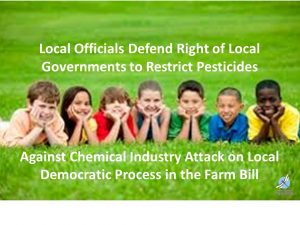01
Oct
Take Action: Let Towns Keep the Right to Restrict Pesticides in Their Communities
 (Beyond Pesticides, October 1, 2018) Last year, pesticide manufacturers tried to undo local pesticide ordinances in a large state-by-state lobbying effort. That failed. Now they are trying to get Congress to undo these local rules in one fell swoop through an amendment in the Farm Bill.
(Beyond Pesticides, October 1, 2018) Last year, pesticide manufacturers tried to undo local pesticide ordinances in a large state-by-state lobbying effort. That failed. Now they are trying to get Congress to undo these local rules in one fell swoop through an amendment in the Farm Bill.
In 1991, the U.S. Supreme Court affirmed the right of local governments to restrict pesticides. The chemical industry’s attempt to take away the power of local governments to regulate the use of pesticides was wrong then and it is wrong now –more so, given the current weakening of federal pesticide programs.
Send a letter to the editor of your local newspaper!
The fight to defend the authority of local governments to protect people and the environment has been ongoing for decades. Against a backdrop of decades of pro-pesticide lobbying to limit local authority to restrict pesticide use in our communities and despite industry’s success, there has been nationwide action at the local level. In most states, local authority, under state law, is limited to restrictions on public property, and seven states have affirmed the right of localities to restrict pesticides on all land within its jurisdiction. Because of effective efforts across the state of Maine, the American Legislative Exchange Council (ALEC), an industry-backed group, backed a failed effort over the last two years to take away, or preempt, local authority in the Maine state legislature. Meanwhile, more than 60 local officials from across the country sent a letter to Congress in mid-September opposing a Farm Bill provision that takes away local governments’ authority to restrict hazardous pesticides. The provision will overturn the Supreme Court decision and prevent communities from adopting protective laws that meet the needs of their residents or unique local environment.
“Existing federal law regulating pesticide use has long given states and local governments the authority to craft pesticide policy tailored to local needs, and there is no reason for that long-standing policy to change in this Farm Bill,” Senator Angus King (I-ME) told the Bangor Daily News. “I broadly believe in local control and states’ rights, and in this case, I hope that the final Farm Bill will reflect the Senate’s version by not including this provision to restrict state and local government’s ability to enact their own pesticide standards,” he said.
This controversy has emerged at the same time that the U.S. Environmental Protection Agency (EPA) has reversed decisions intended to protect public health.
Last month, a federal court ordered EPA to ban a widely used pesticide because it ignored findings from its own staff about its dangers to children and farmers. The 9th Circuit Court of Appeals ruled that EPA failed to counteract “scientific evidence that [chlorpyrifos] residue on food causes neurodevelopmental damage to children.” It also faulted the EPA for not following the assessment from agency scientists that the pesticide was harmful.
A jury verdict last month awarded a groundskeeper stricken with non Hodgkins lymphoma $289 million in a case that showed harmed caused by Monsanto’s product glyphosate/Roundup. Many communities want to ban Roundup in the face of EPA inaction.
For more good reading on this subject, see (i) an op-ed written by two mayors, (ii) an editorial in the Portland Press Herald (ME), and (iii) and editorial in the Bangor Daily News (ME).
Send a letter to the editor of your local newspaper!
Letters to the editor can have a major influence on public opinion, especially that of lawmakers representing the community. Most smaller or regional newspapers have a word limit of around 250 words, while larger metropolitan newspapers limit letters to 150 words. We suggest a 150-word letter that you can personalize. If your newspaper is a smaller paper, you can add talking points to increase the effectiveness of your letter.
Sample letter:
With legislation pending in Congress to take away our community’s right to restrict pesticides, it is critical that our newspapers and politicians take a stand against this effort that undermines democratic principles. The pro-pesticide lobby –chemical, pest control, and chemical lawn care companies— has long tried to undo the growing number of local pesticide ordinances state-by-state, having failed to accomplish this in the U.S. Supreme Court. Now they want Congress to undo local rules in one fell swoop through the Farm Bill.
A number of cities have passed landmark legislation to restrict pesticides, require organic land care, and protect public health. Federal preemption of local authority is contrary to our country’s founding principles. Local governments hold public hearings, conduct research on adverse pesticide effects, learn about the efficacy of ecological land management practices, and often decide pesticides are not necessary. That is a right that must be honored and preserved.











Let this be a local issue.
October 2nd, 2018 at 12:47 amNo pesticides in my area
October 2nd, 2018 at 2:18 pmDear BEYOND PESTICIDES people,
November 9th, 2018 at 4:58 pmI sent your sample letter expanded slightly, to the Chicago Tribune, recommending they use it in their suburban section, to The Doings from Hinsdale IL, the Oak Brook Times in IL, and the Suburban Life in IL. Hopefully someone in those newspapers will publish your letter. Trying to be of help! K
Pesticides need to be restricted to protect health and the environment.
November 9th, 2018 at 5:22 pmLet us protect our kids and lives! If we believe in democracy we must not allow our local protections to be invalidated!
December 4th, 2018 at 5:56 pm